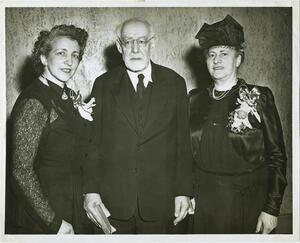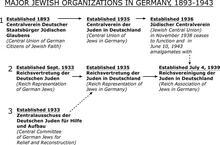Ottilie Schönewald
Ottilie Schönewald was born to a wealthy yet liberal family. The premature death of her father pushed her to learn how to manage her family business. She adopted those skills into her role as a member of the city council of Bochum and the League of Jewish Women (JFB). Becoming the chairwoman of JFB in 1934, Schönewald helped Jews emigrate from Germany and only fled after her husband was arrested in 1939. During the war, she continued her social work in England with the Cambridge Club of Refugees and helped reestablish the International Council of Jewish Women after the war. Schönewald remained a participant in several organizations and took political relations courses until her death in 1961.
In her autobiography, Ottilie Schönewald wrote, “The German Women’s Movement had the greatest influence on my life.” Deeply involved in several women’s and Jewish organizations, Schönewald was a feminist activist who became a politician to advance her causes. From 1934 to 1938 Schönewald chaired the League of Jewish Women in Germany. Following the November pogrom of 1938, she had no choice but to dissolve the League. In 1939 she fled Germany, going with her family to the Netherlands and shortly afterwards to England.
Early Life
Ottilie Schönewald was born in 1883 in Bochum, Germany, to Sofie (née Levy, 1850–1926) and Isidor Mendel (1848–1903). Ottilie was the seventh of eight children. From early childhood she was aware of discrimination against Jewish girls and the preference for sons. In her own family, she witnessed the disappointment of her sister upon hearing that her mother had given birth to another baby girl. There would be none of the traditional candies which would have been received by the children during the circumcision celebration of a brother. Perhaps this observation was the origin of her feminist activities as an adult.
Ottilie’s parents were the owners of a business. They were wealthy and bourgeois, but also very liberal. All eight children received an excellent education. Ottilie Schönewald attended a girls’ school and earned excellent grades. She would later remember a very happy childhood during which she was given much freedom and intellectual encouragement by her family.
The first momentous change in her life came with the early death of her father in 1903. Ottilie was 20 years old. Fortunately, shortly before he died, her father had been giving her bookkeeping lessons. With this knowledge, she was able to support her mother and to maintain the family business.
Early Career
In 1905, now twenty-two years old, she married Dr. Siegmund Schönewald (1872–1943), a lawyer. Throughout the years of their marriage, he supported her feminism and her voluntary employment in many different organizations. She wrote in her autobiography that it was the strong backing of her husband that allowed her to be an activist and a politician. Shortly after her marriage, Ottilie began her involvement in Jewish and women’s politics. In 1919 she and her husband adopted a daughter, who remained the “high point” of her life. When her daughter was young, she used to sleep only six hours a night so that she could be a mother and still be active in different organizations. While the girl was sleeping, Ottilie prepared her speeches and meeting agendas.
Shortly after German women received the right to vote in 1918, Ottilie Schönewald became a member of the German Democratic Party and a member of the city council of Bochum. In 1926 she was compelled to retire from these activities as the Nazi party had gained an overwhelming mandate and used it to suppress all political opposition. From then on she became active in the League of Jewish Women. From her first experience, in the local group of her birthplace, Bochum, she went on to become a member of the executive committee of the League in 1929. Her influence and her level of activity in this organization increased until, in 1934, she was asked to become its chairwoman.
Work in Nazi Germany
It was not easy to be the head of any Jewish organization in Germany during the Nazi regime. The League often had to amend its politics and its strategies in the face of overwhelming legal antisemitism. At first the women of the League were skeptical about any emigration of German Jews. Following the passage of the Nuremberg Laws on September 15, 1935, which deprived Jews of German citizenship and many civil rights, the League began to support emigration of Jews from Germany, especially for women and girls. The persistent observation of the League by the Nazis caused other problems. For every event they held, the women needed the permission of the Nazi authorities. Ottilie Schönewald recalled an occasion during an event in Gelsenkirchen, in either 1936 or 1937, when she had not had time to get permission for her speech. The two officers from the Gestapo who came to observe the lecture gave her their permission to speak and promised to listen very carefully. Ottile Schönewald—who had an irrepressible sense of humor—wrote, “I promised them that they would hear about things about which they certainly didn’t know anything. ... In this way I was sure that I would have at least two very interested listeners.”
Shortly after the November pogrom in 1938, the League of Jewish Women, along with other Jewish organizations in Germany, was formally disbanded by the Nazis. During this period, Ottile’s husband, together with thirty thousand other Jewish men, was arrested. The men could be released only upon their promise to leave Germany immediately. Ottilie Schönewald arranged emigration for her husband. The Schönewalds left Nazi Germany as a family in March 1939 and took refuge in the Netherlands. There Ottilie Schönewald, with the support of the Women’s Movement in Netherlands, continued her rescue work, helping women and girls to escape from Nazi Germany.
Work During After WWII
After six months in the Netherlands the Schönewald family fled to London, where Ottilie became active in the Association of Jewish Refugees, founding a branch of the organization in Cambridge. She was active in social work and worked for the Cambridge Club of Refugees. During this period of her life Schönewald found time to attend the University of Cambridge to study English Language and Literature. Ever practical, she also attended some bookkeeping classes. She did not slow her pace when she moved to the United States of America in July 1946. Her daughter had already relocated to Chicago and had married; Ottilie Schönewald made plans to join her.
In the United States, Schönewald participated in reestablishing the International Council of Jewish Women (first founded 1930 in Hamburg, Germany). She served as the president of the Leo Baeck Chapters of B’nai B’rith. She continued her studies at the Henry George School of Social Science and attended classes in public relations, all the while remaining very active in several organizations.
In 1958, when she was seventy-four years old, Ottile Schönewald was asked by the Leo Baeck Institute of New York to write the history of the League of Jewish Women in Germany. Unfortunately, she was not able to complete the work before her death three years later, at the age of seventy-seven, in Chicago.
In 1998 the Council of the city of Bochum named a street after her.
Selected Works
“Die Gemeinde und die Frauen,” Blätter des Jüdischen Frauenbundes, October 1937; “Lebenserinnerungen.” MS. New York: 1961, 22 pp. Parts of it are published in: Richarz, Monika. Bürger auf Widerruf. Lebenszeugnisse deutscher Juden 1780–1945, München: 1989, 418–423. See English version in Richarz, Monika. Jewish Life in Germany: Memoirs from Three Generations. Bloomington, IN: 1991.
Aufbau, No. 1, 1954, p. 13.
Aufbau, No. 1, 1959, p. 20.
Biographisches Handbuch der deutschsprachigen Emigration, I, München: 1980, 663.
Kaplan, Marion. Die jüdische Frauenbewegung in Deutschland. Organisation und Ziele des Jüdischen Frauenbundes 1904–1938. Hamburg: 1981, 145–148.
Keller, Manfred. Wilbertz, Gisela, eds. Spuren im Stein, Essen: 1997, 274.
Lowenthal, Ernst G. Juden in Preussen. Biographisches Verzeichnis, Berlin: 1981, 203.
Maierhof, Gudrun. Selbstbehauptung im Chaos. Frauen in der jüdischen Selbsthilfe 1933–1943. Frankfurt/New York: 2002, 87–92, 344.
MB-Mitteilungsblatt des Irgun Olej Merkas Europa, 7.7.1961, p. 7.
Tetzlaff, Walter. 2000 Kurzbiographien bedeutender deutscher Juden des 20. Jahrhunderts. Lindhorst: 1982, 298.
Walk, Joseph. Kurzbiographien zur Geschichte der Juden 1918–1945. München/New York/London/Paris: 1988, 334.
Archives:
Leo Baeck Institute, New York: Collection of Ottilie Schönewald.
Jewish Museum, Frankfurt/ Germany: Collection Dora Edinger includes correspondence from Dora Edinger and Ottilie Schönewald.
Institut für Zeitgeschichte, Munich/ Germany: Augenzeugenberichte deutscher Juden nach 1933, MSZ: Some reports of Ottilie Schönewald.




